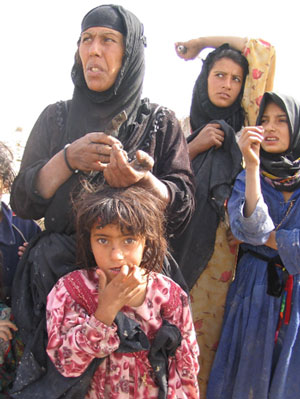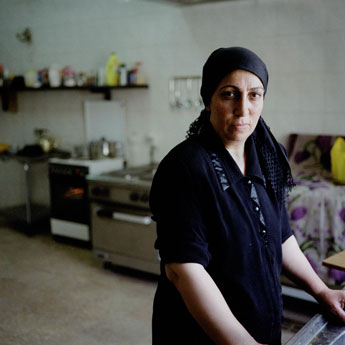 |
 |
The Unbearable Heaviness of Truthtelling
January 2004
|
 |
|||||||||
|
I have been desensitized to a lot of things in my reporting career. I've talked to murderers and sadists, and people who have just moments before seen their sons or daughters die brutal deaths. But nothing could prepare me for the interviews I was to conduct every day for the next month in Iraq. There's something about hearing over and over again about the tortures of a cruel leader that goes beyond desensitization. I felt numb. I found myself getting tired and agitated, arguing with the translator about small facts right in front of my interview subject. Did he cut the feet off during the FIRST or the second stay in prison? "You've completely confused me," I snapped one day. "It was the first time," the subject repeated calmly.
"Do I fear death?" she smiled slightly, looking right through me. "No, I don't fear death." But it was the look in her eyes that got to me. It was so deep and so far away, as if death were the most minor of incidents on the road that she had traveled. "Death will be easy," she said. She and I became friends and she invited me to join her for lunch whenever I could. I pushed from my mind the image of her stripped naked, tied to a tree and covered in cooking oil, being attacked by dogs under orders of Uday Hussein. She said she loved me, that in my eyes she saw what America represents to her: compassion for human life, passion and a joy she has never seen in Iraqi people. She wanted me to live with her so she could be closer to freedom. Every day I would take notes, diligently trying for every detail. One man spent 20 years in a 5x5 meter cell with 40 other political prisoners. They had to stand in line to get to a crack in the wall for fresh air. If he was caught speaking to another person he was put in solitary confinement in a room with red walls for days on end. When I asked him what he dreamed for himself in the future he said he was too tired to dream. But at some point he wanted to get married.
After three or four interviews, even if it was only 3 p.m., I returned to my hotel exhausted wanting to sleep, or drink, or cry, or just sit and stare at a white wall and hear dumb jokes, which is often what I did. Sometimes I wondered if I could become so dissociated that I would lose my compassion. The mind does amazing things to protect itself. None of this really surprised me. I certainly anticipated the stories, the exhaustion, the distance. But I didn't expect to feel so numb, almost too afraid to feel because there was so much to take in. I know journalists aren't supposed to take in ANY of it; we are merely supposed to be the vehicle through which a story is shared. But in Iraq there were nights when I could not sleep until a story found its place or until I could feel some peace. And then there were the Americans. Once the US invaded, they immediately occupied the majority of, if not all, Saddam's lavish palaces and quickly made them off limits to Iraqis — just like Saddam did. The central command center is in one of the mmost extravagant of these complexes, and Paul Bremer's office is tucked behind marble walls, long red carpets, brilliant chandeliers and many, many armed guards. My days in the Green Zone were filled with a kind of fascinated repulsion. I was shocked by the decadence and military rules that ensured Americans experienced very little of Iraqi culture. One rule prohibited Americans from eating local food, so I visited one dining facility where polite Sri Lankans (Iraqis are not allowed to serve food) served shrimp jambalaya, catfish and hotdogs. I ate my first salad in weeks, and chatted with people who were amazed I lived in Baghdad without a gun and wanted to know what it was like "outside." In the evening I went to the discoteque at the Al Rashid hotel where rap music blared and young black soldiers sparred rhythmically on the dance floor. Cans of beer were piled high on tabletops and one of the women was carried out after drinking too much. Outside the entryway, an Iraqi man swept the marble stairway and greeted scantily dressed girls as they walked inside. Most soldiers aren't allowed inside the Al Rashid because of the alcohol, but some have access, as do the employees of various NGOs and corporations, many of which were housed in the luxury hotel. None of this is lost on the Iraqi people.
It doesn't stop there but I have to answer: "Iraq was amazing. Everything you can imagine and a lot you can't." Some days, some moments, I just leave it at that.
© Zelie Pollon
|
||||||||||
|
Write a Letter to the Editor
Join our Mailing List
© The Digital Journalist
|


